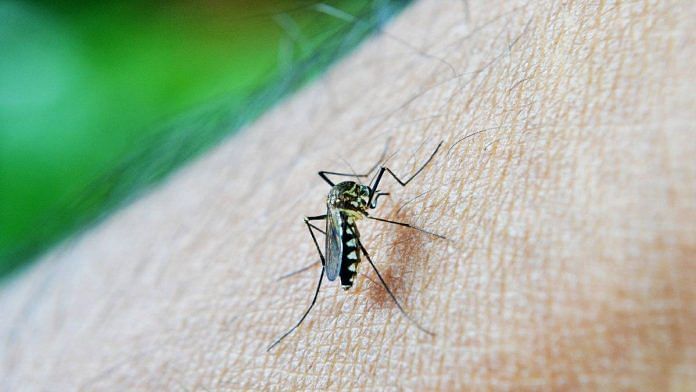The coronavirus pandemic is irrefutably one of the most tragic and disruptive events of this millennium. Covid-19 has cost thousands of lives across the globe, and has brought the world to a screeching halt.
India’s response to the pandemic has been calculated so far — with the lockdown and its subsequent extension. But even with the Narendra Modi government’s decisive response, there are concerns about balancing India’s current coronavirus-related public health priorities and maintaining existing health programmes.
Malaria is one of those crucial public health priorities for India. In pre-monsoon season, India can’t afford to forget about malaria. Even during the coronavirus pandemic.
Also read: Mosquitoes kill more people every day than sharks do in a century
India’s malaria burden
For years, India has been ravaged by malaria, the deadliest of all mosquito-borne diseases. India and 19 countries in sub-Saharan Africa carried almost 85 per cent of the global malaria burden, and the disease caused 4,05,000 deaths in 2018 alone, according to the World Malaria Report 2019.
India’s total economic burden from malaria is pegged to be around US$ 1,940 million. In adults, malaria leads to an average of 2–6 days of lost productivity. Mothers and other caregivers sacrifice a further 2–4 days each time a child or other family member contracts malaria. The disease disproportionately affects the financially weaker sections of society as well as pregnant mothers and children under the age of five.
These concerns led to Prime Minister Narendra Modi’s call in 2015 to eliminate malaria from the country by 2030. The government launched a National Framework for Malaria Elimination (2016–2030) as a long-term strategic roadmap to achieve the goal, and a subsequent five-year targeted strategy plan was also launched the next year.
Also read: Latest tool in fight against malaria: Dogs that can sniff out malaria from our socks
India’s progress against malaria
Since the declaration by PM Modi in 2015, India has reduced its malaria cases by nearly 69 per cent, according to data on malaria by the National Vector Borne Disease Control Program (NVBDCP). The progress has been lauded by the World Health Organization (WHO). Till 2017, India was among the top four countries in the world with the highest malaria burden; however, the World Malaria Report 2019 (capturing data from 2018) revealed that India even alleviated itself out of that group.
It is important to understand that malaria cases increase during monsoon, because the weather creates favourable breeding ground for the mosquitoes that carry the dieasese.
Hence, India’s progress in controlling malaria has been a result of pre-emptive measures taken by authorities before the onset of monsoon, and rigorous surveillance and testing during monsoon.
However, the coronavirus pandemic can disrupt these measures this year.
Also read: Malaria cases down in India by 51% in 2018 but it’s still among worst-hit countries
Threat to malaria control measures
To sustain the decline in malaria cases, it is important that case surveillance is intensified starting pre-monsoon season and sustained through the monsoon. This requires prioritising malaria work between May and September at the grassroots level. It’s also important for India to replenish long-lasting insecticidal nets in high burden areas in time to maintain the gains achieved since 2016.
Measures such as mass-screening camps, sanitation, vector control, and fogging play a crucial role in limiting malaria’s potential in monsoon. However, these may face a setback given our workforce’s current involvement to tackle Covid-19. For example, the majority of municipal staff – including domestic mosquito breeding checkers – who usually perform sanitation work are now consumed with activities such as contact tracing for Covid-19 cases. This has already resulted in an increase in mosquitoes in some areas in Delhi, among other regions.
Continuous rise in Covid-19 cases can change India’s priority, but intensive control of mosquito breeding grounds (sites), which is required during these critical months, may be affected.
Also read: Hydroxychloroquine: The special drug Trump and the world are dialling PM Modi for
Strategising a balanced way forward
These factors raise serious concern about the health of India’s malaria programme for 2020 and whether India will be able to sustain its consistent decline in malaria cases. There is a distinct possibility of cases increasing in the hotspots of malaria-endemic states such as Uttar Pradesh, Chhattisgarh, Odisha and likely emergence of new hotspots or localised outbreaks of malaria, if prevention activities lose their intensity. Further, sustenance of malaria programmes will help decrease extra burden on hospitals struggling with Covid-19 patients.
While this pandemic is a pressing new priority for the Modi government, it’s important that existing public health issues are not kept on the back-burner. Malaria has wreaked havoc on Indian society for years.
This World Malaria Day, we should resolve to strategise in a way that maintains a balance between our new and existing public health priorities.
The author is the Country Director, Malaria No More India. Views are personal




Only way to get rid of malaria is proper sanitation infrastructure. But the Elites like you makes jokes about govt’s sanitation drive